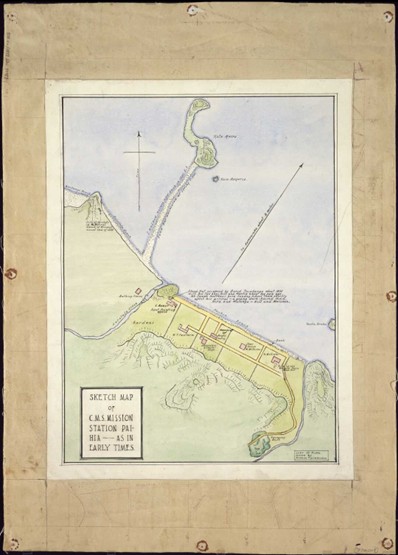
Christmas was just around the corner, and the day marked the conclusion of exams for pupils at Paihia’s Church Mission School. Prizegiving was held in the morning, with the Reverend Henry Williams then offering everyone a rare afternoon off.
In celebration of the special occasion, the whole settlement of Paihia and the surrounding area, Māori and Pākehā alike, went to the northern end of Horotutu Beach for a game of cricket. This was New Zealand’s first ever recorded cricket match.
‘Turned the boys out to play at cricket by way of a finish…. The boys practised on Horotutu Beach at 2pm near Paihia,’ wrote Reverend Williams in his journal.

The young ladies of the settlement seem to have opted out of the game. According to the Reverend, ‘the weather is fine, distributed prizes to the girls, all fatigued.’
Space for a cricket pitch in the area was difficult to find, but the northern wicket was placed roughly 20 metres from the steep hill and about 10 metres from the edge of the firm bank next to the sand.
Teams consisted of 40 or 50 a side, and ‘fielders pleased themselves as to the position they took in fielding, and things were generally carried out in a very independent manner all round.’

Five-year-old Edwin Fairburn joined in on the day, and later recounted his experience in his memoirs.
I remember when my turn came (I had, had some practice at ‘round trap’ hitting balls) Mr. W. Williams who bowled to me saying we mustn’t be too hard on the youngsters – or something to that effect delivered me a very nice gentle ball which I hit over the bank (about 11 yards off) on to the beach where it rolled down some distance on the hard sand – and I got a run – at which our side applauded – while the other side grumbled and called out for short work to be made of me – The ball was thrown up to the opposite bowler who straightaway bowled me out – but I got a run in the first game of cricket played in NZ.

Reverend Williams, in his journal, noted that the boys were ‘very expert, good bowlers’ — and with the Williams family having imported the equipment themselves, the boys most likely had experience playing the game prior to the first written recording. Edwin Fairburn recalled, ‘Mr W Williams (after-wards the first Bishop of Waiapu), had sent home for cricket balls and bats and there was great excitement about the new game to be played.’
Almost exactly three years later, on 21 December 1835, during the voyage of HMS Beagle, the naturalist Charles Darwin noted young Māori men playing cricket with the son of a missionary at Waimate, Bay of Islands:
‘In the evening I saw a party of them at cricket; when I thought of the austerity of which the Missionaries have been accused, I was amused at seeing one of their sons taking an active part in the game.’
It seems fitting that, in New Zealand, cricket had its origins in that popular Kiwi pastime of a loosely organised summer game of beach cricket. From these modest beginnings, cricket continued to develop as our summer game, with cricket clubs around the country established from the 1840s, First Class associations developed from 1875, and the New Zealand Cricket Council (NZCC) founded in 1894. Following the first national representative side taking the field in 1894 against New South Wales, New Zealand had increased exposure to the international game in the lead-up to its first Test match in 1930, and first Test win in 1956. What would Reverend Williams say if he knew!